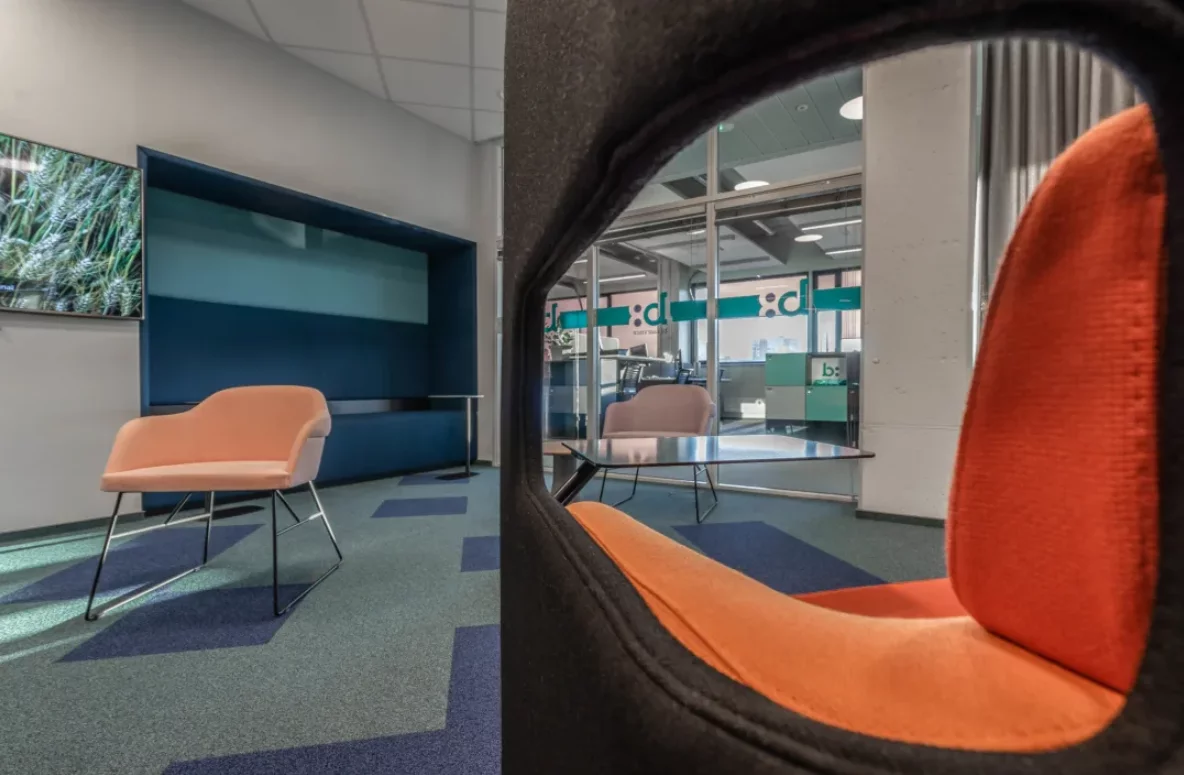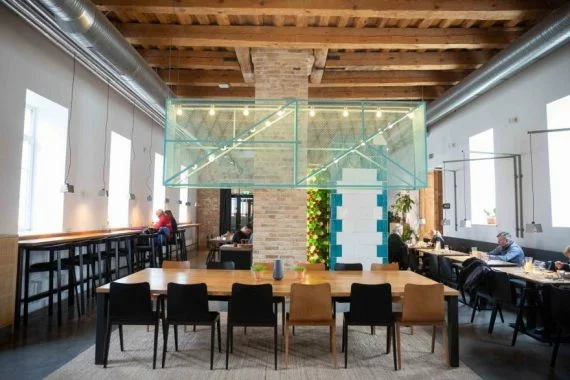
How to relocate your business to Lithuania while avoiding «expensive» mistakes? Step-by-step instructions from a Capital Commercial expert and the personal experience of an IT company
Partner material
The world is, in spite of everything, open, which implies the development of business and the possibility of relocating companies to different countries. Together with the head of the Capital Commercial office, Yulia Tyslenko, we will tell you about the nuances of moving your business to Lithuania: how to draw up the necessary documents, where to find suitable commercial premises, and what you need to take care of in advance to make the move as comfortable as possible. Everything the business sector wanted to find out and didn’t even know to ask was is in our series of articles.
«Lithuania is still an ideal place to do business, but not for everyone anymore!»
— What are the conditions for doing business in Lithuania now? Have they changed recently?

— Until February 24, 2022, the conditions for starting and conducting business in Lithuania were, we can say, ideal for citizens of all countries. In addition to running your own business, Lithuania provided opportunities to find a job and earn a decent income for any person, were it a local or a visiting citizen of any other country. What can I tell you, — from what I saw, practically all Bolt drivers are Ukraine natives.
Now the world has changed, and these changes have affected, first of all, the citizens of Russia, Belarus and Ukraine. Whether Belarusians and Russians will be able to open a business in Lithuania now is a big question. And whereas for companies of Russian origins all is more or less clear, — due to various sanctions they will not be able (in the near future accurately) to open a business in Lithuania, — then with companies whose roots are in Belarus, everything is still up in the air. In my opinion, there is still a chance.
As for foreign companies from other countries, the conditions for opening and conducting business have not changed much. In order to open a CJSC (Closed Joint-Stock Company) in Lithuania, only a minimum authorized capital of €2,500 is required. Then you need to apply to the registration center, get a director and find suitable commercial premises (the address to which this company can be «tied»). Thus, the company will be opened in just 4-5 days, and then it remains only to start working. This is such a simple, uncomplicated process. It is so well thought out that in registration centers there are people who, in addition to Lithuanian, speak the main world languages (Russian, English, etc.), and they will easily explain applicants what to do.
— What industries are the most popular for business relocation now?
— Some «mastodons», like Microsoft, Oracle, Citco, Western Union, DPD opened their offices in Lithuania long ago and have been working in our market for many years. If we talk about relocation now, then the IT industry and everything related to it comes first. Probably, this area is one of the easiest for a relocate — employees of such companies only need, conditionally, a table, a chair, a computer and an Internet connection at the initial stage. At the same time, customers for their projects can be in any country, regardless of where the company’s head office is located.
If you plan to transport production, it will be more difficult and expensive, but also quite possible, as our experience shows. Not long ago, we successfully worked on finding a suitable land plot for the construction of a small plant, a so-called «build-to-suit». Of course, the site was not located in the capital, but in its suburbs, but taking into account its transport accessibility, it was more an advantage than a disadvantage.
After large banking sectors opened their offices in Lithuania and firmly strengthened here, the direction of financial technologies began to develop and even «Danske Campus», which is a real city within the city, appeared.
The head offices of Swedbank and SEB Bank, which additionally leased a building in one of the largest projects of commercial space, «Technopolis», became iconic for the capital. Western Union, by the way, rents a whole building there.
Against this background, a lot of startups related to the financial sector are opening up in Lithuania. This area is just on the rise at the moment, and many companies are relocating their business to Vilnius and Kaunas. Right now I work with financial companies from Estonia, Singapore and Israel that want to open offices in Lithuania. These companies are developping payment platforms through which money transfer operations can be carried out. Although they are all startups, they are promising and developing very quickly.
— Are there any truly «breakthrough» bonuses that help business develop in Lithuania?
— There are really many bonuses for business in Lithuania. For example, some business sectors are subject to preferential taxation for the first few years of the company’s existence. In our country, the concept of free-trading-zone has been created, which has been working successfully for several years in 7 Lithuanian cities: Klaipėda, Kaunas, Panevėžys, Marijampolė, Kėdainiai and Akmyana. The essence of this concept is that land plots are leased for 99 years, and plants, warehouses are built on them, or some production is launched. It can benefit from preferential taxation: 10 years without income tax and 20 years without real estate tax. This concept was invented to make business more active in peripheral regions and small towns, thereby attracting investments and labor. We are not talking about some forgotten villages, though: such «preferential» territory begins practically right at the borders of big cities.
Another, no less important, bonus is the possibility of obtaining a residence permit after starting a business in the country. This is an important nuance that will allow expats to feel confident in our country and live almost on the same conditions as the local population. At the same time, you should take into account that Lithuania does not provide the opportunity to obtain a residence permit when acquiring real estate (as other countries do), so the option of opening a business in Lithuania in order to obtain a residence permit can be considered as a good way to get even more freedoms.
It is impossible to say that this is a «breakthrough», but I cannot but tell about the actual European standard of living that Lithuania offers. Thanks to the infusions of the European Union, our country has begun to develop not only large, but also smaller cities — a developed infrastructure, convenient transport links, beautiful architecture, high-quality roads and all the necessary conditions for life. I see a bonus in the opportunity to live and build your business in a small city without feeling the pressure of a metropolis, but receiving almost all the benefits that a large city can provide.

The first steps of a business relocate
— What should a company that wants to relocate to Lithuania do, first of all?
— The first thing to do is to decide on the timing of the move and the necessary amount of commercial space at the initial stage. This is really important because it will determine the request you will make to an intermediary and seriously narrow down your search for commercial premises.
For example, not so long ago, we relocated an IT company from Belarus which, for the first six months of its operation, needed to get commercial premises for a maximum of 3-4 workplaces. They understood that it would not be possible to move all employees at once, and some of them would also refuse to move (for personal reasons). As a result, the business’ executives were preparing for the move and were quite ambitious about the hunting of local workforce in the future. Why not right away? Because here there is a problem: in order to hire local specialists, it is necessary to have an office of the company where potential candidates can come for interview, and it is expensive and impractical to rent large areas at once.
However they understood immediately that, if they needed a small room then, in six months they would need to expand. And a year later, even more. But most of the commercial space in Lithuania is rented for a period of at least 3 years, and in the event of early termination of the contract, the tenant will be forced to pay significant fines (up to full compensation of the rental price). This way, landlords insure themselves for the return of investments in the renovation of premises and the search for a tenant. What should the tenant do, then? The answer is — you need to look for commercial premises from large developers who have large-scale projects with premises of different sizes. Usually, within such projects, companies can move to larger premises without penalties and losses.
At the moment, there are three such projects in Vilnius: a large hub in the Antakalnis area, Vilnius TechPark; a huge city within a city, Technopolis, and a new project called «Business Garden», which is located at the exit towards the second largest city of Lithuania — Kaunas. Each of these projects has its own nuances and advantages: some have a more favorable location, but higher prices for rent (including housing), while others only offer commercial premises without providing the necessary social infrastructure and housing nearby. Some may provide housing and infrastructure, but be at a significant distance from the center of the capital.
As a result, understanding all the nuances of each location, we chose accomodation in «Technopolis» for this company, as this project is a full-fledged city within a city, around which a whole area of new buildings has already grown. This means that employees will not have to go anywhere: here you can rent/buy accommodation, take your children to kindergartens and schools, go shopping in the large shopping center OZAS and attend concerts in the Avia Solutions Group Arena, where the main events of the city take place. There are also walking areas with a beautiful pond, sports clubs and cafes/restaurants where you can have a great weekend.
— What «pitfalls» are there in Lithuania for conducting or locating your business? What should companies that want to relocate be warned about?
— The first thing that comes to mind, and I have spoken about it before: you are not likely to be able to conclude a short-term lease agreement for commercial premises. As a rule, the minimum term of such a lease is three years. But what if the company is unsure of how many employees it will have in the future? There is a way out — coworkings. These are workspaces that can be easily rented almost daily and then left behind just as easily. Against the backdrop of the pandemic, coworking spaces were virtually empty for some time, but the situation’s improvements has breathed some «second life» into them, and they are really enjoying popularity among individual entrepreneurs, freelancers, and startups.
Another nuance — very few offices are willing to rent out furnished premises. Such a small factor as the availability or non-availability of furniture can be a problem for the future tenant. If you rent a space without furniture and then furnish it yourself, then you will have to decide what to do with your furniture when moving. If you find a furnished space, the question of how to adapt it to your own needs arises. As a result, this nuance translates into a significant expenditure point that not everyone expects at the very beginning.
But there is also a way out: companies that provide office furniture for rent have begun to open in Lithuania. Also, some large renting companies provide an additional furniture rental services by simply adding a couple of euros to your monthly payments. At this point, the problem turns into a privilege of our market — developers respond flexibly to any requests tenants make and adjust to them in time.
Of course, these are not all the «pitfalls» that business may face when moving. But I voiced these so that the need to get help from Capital Commercial specialists became obvious. Such nuances can arise quite often, and the business will lose time and money on each such obstacle. This will actually not happen if you turn to professionals for help. Without market expertise, many mistakes can be made that will be costly to correct.
«It is rather a natural redeployment of employees from our offices in Belarus and Ukraine to those in Lithuania, Poland and Georgia»
A Realting.com journalist contacted the company Julia mentioned above. A representative of the company answered all our questions, but asked not to mention the name of the company, so as not to endanger its employees who continue to work in Belarus and Ukraine.
— In what industry and how long has your business been working? Why did you decide to relocate?
— Our company has been working in the field of custom software development since 2007. After 15 years, we have offices in 7 countries in the world and our total number of IT specialists surpasses 900 people. At the same time, our company has been creating software development centers in Poland and Lithuania for the past 2 years, so the opening of an office in Lithuania cannot be called a full relocation — it is rather a natural redeployment of employees from our offices in Belarus and Ukraine to offices in Lithuania, Poland and Georgia.
In my opinion, Lithuania in general (and Vilnius in particular) is just close, understandable and comfortable for businesses that were originally established in Belarus or Ukraine. Their solid historical ties, the easiness of negotiations, and a common mental environment are the factors that many businesses rely on when deciding to relocate to Lithuania.
— How did you look for information on the move? What should be the primary focus of attention for those who are just about to take this step?
— Our employees in all countries already had a program/opportunity to work in our offices in any of the countries where we had them. We knew all the local/nationwide regulatory nuances of the structure and organization of employees’ work. Here are our recommendations on what to think about first:
- Legislation/regulations related to invitations, visas, work permits, etc. are changing quite quickly now, so keep a close eye on them so as not to do unnecessary work and not to spend unnecessary money.
- Inform employees who want to relocate about taxes and the net salary they will have left in the end very well. Experience shows that this is really important.
- Ask your employees to look for housing prices, utility costs, and the cost of living before they relocate. This will have a direct impact on their quality of life, and it is better to have this information in advance.
- Do not leave relocated employees alone — without full HR support once they arrive, they may find it difficult to adapt.
As for the business itself, the help of local specialists is important for relocation. We rented our first office in Vilnius on our own, but for some reason it turned out that our employees didn’t really want to work in it. And then COVID-19 made our investments in the office a completely superfluous waste of money. As pandemic restrictions began to ease, our need for a change of location became apparent. And this time, in order not to lose money again, we decided to contact the specialists of Capital Commercial. When searching for an office, they took into account all the nuances: its general location, the availability of recreation areas and meeting rooms, a convenient location within the complex, transport accessibility, rental of residential areas within walking distance, and so on.
— What advantages do you see after moving to Lithuania?
— For our company, being part of the service IT-business, the notion of relocating was completely blurred after the pandemic,. As a result, our employees work remotely in different parts of the world, in fact, they choose where they want to live. The company looks at the locations chosen by the employees themselves and develops a new or additional office infrastructure there. Now we see the development of our Lithuanian infrastructure as promising. As for the advantages, in my opinion, the world has changed very much and, without a flexible approach, including in relocating issues, companies will no longer be able to fully develop.



In our next article, we will continue to talk about relocating businesses to Lithuania, the search for commercial premises and all the nuances of finding housing for the employees of moving companies. Stay tuned, the news is going to be interesting!
























